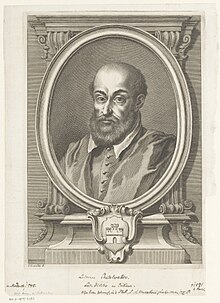fiction.wikisort.org - Writer
Lodovico Castelvetro (ca. 1505–1571) was an important figure in the development of neo-classicism, especially in drama. It was his reading of Aristotle that led to a widespread adoption of a tight version of the Three Unities, as a dramatic standard.
This article needs additional citations for verification. (March 2013) |
Lodovico Castelvetro | |
|---|---|
 | |
| Born | 1505 Modena, Duchy of Modena |
| Died | 21 February 1571 Chiavenna, Three Leagues |
| Nationality | Italian |
Castelvetro was born in Modena, Italy, and died in Chiavenna.
Works
His Poetica d'Aristotele vulgarizzata e sposta ("The Poetics of Aristotle translated in the Vulgar Language and commented on") was called the most famous Italian Renaissance commentary on Aristotle's Poetics.[1] His supposed involvement in translation of Protestant texts caused him trouble with the Church. He was labelled a heretic in 1557, and lived in exile from his native Italy (he was born near Modena). His Giunta, a commentary on the Prose della volgar lingua by Pietro Bembo, is one of the earlier texts on Italian grammar, and linguistics in general; his contemporaries objected to him that his theories were a little too philosophical for their time.

References
- Preminger, Alex and T. V. F. Brogan, et al., The New Princeton Encyclopedia of Poetry and Poetics, 1993. New York: MJF Books/Fine Communications
- Andrew Bongiorno (editor and translator), Castelvetro on the Art of Poetry (1984)
- Stefano Jossa, ‘Ludovico Castelvetro between Humanism and Heresy’, in F. De Donno, S. Gilson (eds), Beyond Catholicism : Heresy, Mysticism, and Apocalypse in Italian Culture (New York: Palgrave/Macmillan, 2014), pp. 77–103. ISBN 1137342021
External links
- Marchetti, Valerio (1979). "CASTELVETRO, Ludovico". Dizionario Biografico degli Italiani, Volume 22: Castelvetro–Cavallotti (in Italian). Rome: Istituto dell'Enciclopedia Italiana. ISBN 978-8-81200032-6.
Другой контент может иметь иную лицензию. Перед использованием материалов сайта WikiSort.org внимательно изучите правила лицензирования конкретных элементов наполнения сайта.
WikiSort.org - проект по пересортировке и дополнению контента Википедии